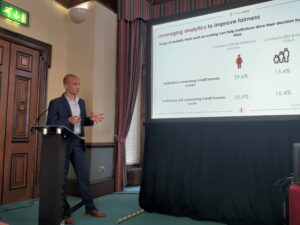Posted on September 25, 2023 by phidi

Creditinfo Group participated in this year’s XVIII Credit Scoring and Credit Control Conference which took place in Edinburgh on 30th August – 1st September 2023. This year’s conference focused on current industry issues and the latest credit risk analytics research findings.

Dmitry Borodin, Head of Decision Analytics Creditinfo Group, and Guilhem Poucin, Senior Risk Analyst Creditinfo Group, presented on “A Winding Road to Credit – Access to Finance for Underbanked Populations”. During their session, they demonstrated how their research examined the issue of access to finance for underbanked populations and identified actionable high impact score-driven solutions:

1️) Using Creditinfo’s global credit bureau footprint, they have explored financial inclusion of the identified populations across various territories, identifying common challenges.

2️) They then introduced a framework to address the most common challenges that limit access to credit for underbanked populations. The framework is to a large extent driven by careful utilization of alternative predictive characteristics such as payment histories on mobile or small loans, telecom and utility data, data on associated parties, and self-reported information. Furthermore, they advocated for the application of thoughtful and unbiased model development methodologies ultimately helping to enhance financial inclusion and expand access to finance for underbanked populations.

Johann Haraldsson, Data Scientist, Creditinfo Group, together with Gunnar Gunnarsson – Executive Director and Analytics and Consultant – Creditinfo Group, presented on “Chunking – A Practical Approach to Manage Consent-based Data Sources in Credit Scoring”. In this session, they presented “chunking” – a methodology used for training a credit score which is designed to handle the fact that different data sources apply to different people at different times. This applies especially to data sources where individuals must opt-in and can opt-out whenever they want. This is to ensure to simplicity, fairness and consistency through time is maintained, while losing as little statistical power as possible.
Kjartan Palsson, Data Scientist, Creditinfo Group, spoke on “Networks- A Practical Graph-Based Approach to Corporate Default Modelling”. During his session, he focused on the network of company connections, specifically how information can be incorporated from neighboring companies to enhance the company credit score. He highlighted on the following:
1) How companies can be connected through various channels, such as ownership structures, common senior staff roles or supply chain relationships. He presented a practical approach to categorizing these channels into “edge strength”, where high strength indicates that defaults are likely to spread to neighboring companies.
2) Ways to use this information to create features which are highly predictive of defaults, particularly for newly founded companies with limited financial data.

Visit www.creditinfo.com for more information.
Posted on September 4, 2023 by phidi

Reform of BICs, impact of inflation on solvency, feedback from the Checkinfo service – an overview with Sidimohamed Abouchikhi, Regional Director for Francophone Africa of Creditinfo Group, and Director of the Board of Directors of Checkinfo.
Finance News Hebdo: In this inflationary context, what assessment do you make of individuals’ and businesses’ insolvency risks?
Sidimohamed Abouchikhi: Inflation first impacted the distribution of loans after the successive increases in the critical rate (+150 bps), partially passed on to the interest rates applied by credit institutions (+53 bps). If we compare the first six months of the year 2023, we see a virtual stagnation in requests for the granting of credit, whereas usually, we have an increase between 5 and 8% (minimum), or even more than the part of individuals. For businesses, the decline in demand is mitigated when government support programs are included. To come back to your question, inflation naturally induces a reduction in purchasing power and impacts payment habits. We see this with the increase in non-payments which is undoubtedly significant but less than that observed internationally. The evolution of unpaid debts in number is more marked among individuals, whereas in terms of outstanding, the majority is among companies. All in all, we are on a return to normative levels of due payments. Not at the same level as 2019, but improving in 2020 and 2021.
FNH: After a long wait, the government has finally adopted the bill dedicated to Credit Information Bureaux. What are the main contributions of this reform?
Sidimohamed: The long-awaited reform of the Credit Information Bureaux (BIC) will allow better control of systemic risks and better accessibility to financing. It will also make it possible to take a big step towards financial inclusion and ensure that the BICs collect other sources of information besides traditional data. This so-called alternative data from major billers, such as telecom operators, water and electricity suppliers, insurance companies and others, will compensate for the lack of historical information on unbanked customers. The availability of this information will allow financing institutions to open up, with less apprehension, to new customers (individuals and VSMEs) who do not have a banking history but justify good payment habits. And this while reducing the use of guarantees. I remind you that of the 53% of the population with a bank account, less than 30% have access to credit. Therefore, this reform aims to widen access to financing for this population outside the circuit.
FNH: What are Creditinfo Group’s priorities in Morocco and West Africa in the short to medium term?
Sidimohamed: With more than 30 active credit bureaus, Creditinfo now has the most robust global presence in this sector. For over 25 years, we’ve provided credit bureau and risk management solutions and trusted business information to some of the world’s largest lenders, governments and central banks. The objective is to increase financial inclusion and generate economic growth by allowing access to credit for SMEs and individuals. Creditinfo is the industry leader in Africa, with a presence in 18 countries. The company which continues to be strengthened with two new acquisitions dating back barely a month, in Uganda and Namibia.
FNH: Checkinfo, Bank Al-Maghrib’s delegate for managing the irregular check centralization service, started its activities in April 2021. What is your experience feedback to date?
Sidimohamed: After two years of activity, and according to the feedback from our users, we can say that Checkinfo has a significant positive impact on their cash flow and the hassles associated with collection. Indeed, it should be known that 84% of the checks checked and posted irregularly come from accounts in prohibited banking. Therefore, these people are already in banking irregularity because of bad checks or other, and continue to issue checks which, of course, will be returned unpaid. Today, Checkinfo allows its users to protect themselves against these frauds. Moreover, the efficiency rate of the service is 99.6%. Also, you should know that out of all the checks that are checked, 13% are irregular.
Article translated in English as first seen on Finance News Hebdo
For more inofmormation visit: www.checkinfo.ma











